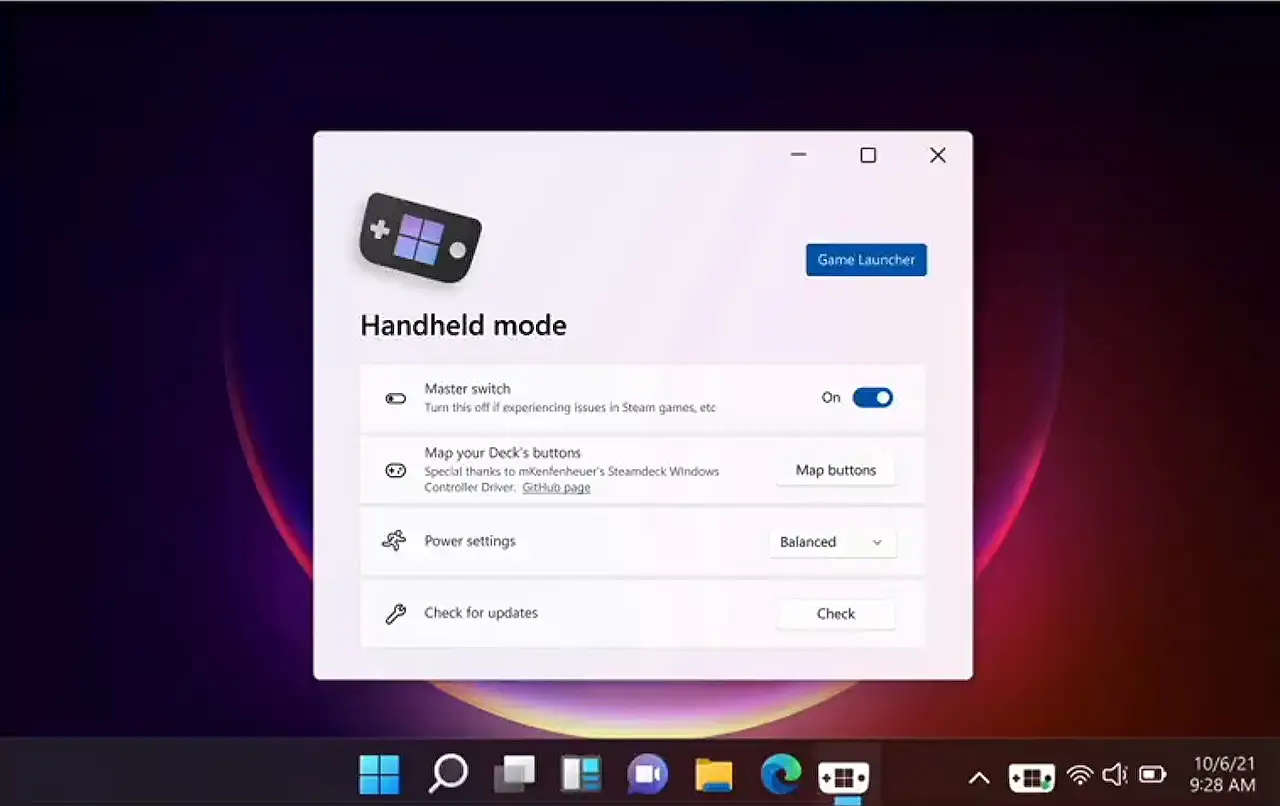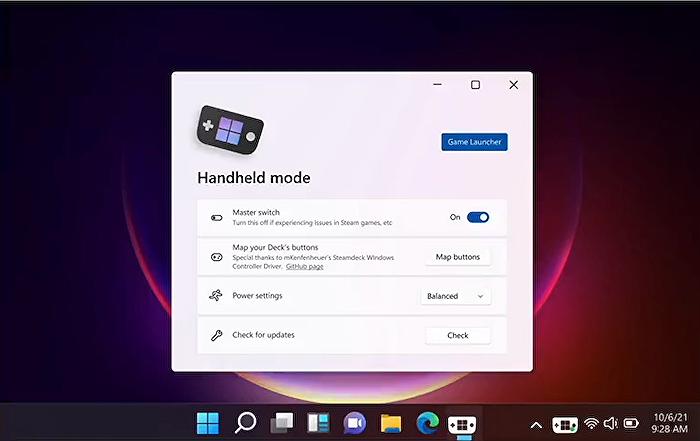- All of Microsoft

Potential Handheld Mode Feature in Windows 11 Update
Microsoft developing a Handheld Mode for Windows 11, enhancing gameplay on devices like Steam Deck.
Microsoft Steps into Handheld Gaming
In response to the growing popularity of handheld gaming, the latest Microsoft move involves exploring the potential of a handheld mode on their latest operating system. The prototype, showcased in a leaked video, displays an optimized user interface for handheld devices, as well as a new gaming shell tailored for touchscreen and controller gameplay.
The video, part of an internal competition, hinted at the challenges of adapting Microsoft's existing operating system for handhelds. The hardware lacks a native interface that's easy to navigate, unlike its competitor, SteamOS, which comes with a built-in launcher.
Dorothy Feng, a seasoned UX designer at the company, has created a launcher prototype that might become a game-changer. With the ability to load games from various stores, including Steam, PC Game Pass, EA Play, Epic Games Store, amongst others, it drastically improves the gaming experience.
Learn more about the Windows Operating System
One of the noteworthy features of this prototype is a keyboard customized for the Steam Deck, operable via a game controller. It also presents a floating taskbar, a potential preview to a more intuitive and adaptable user interface. A developer working parallelly has also devised a way to utilize the Steam Deck controls optimally on Microsoft's platform.
This internal project also involved the contribution of Hayden McAfee, a software engineer specializing in gaming experience. His creative input led to gaming shell customization tailored to Microsoft's platform. Blessing to gamers, this enables quick and easy game launches from different stores.
However, this ambitious transformation isn't without its roadblocks. To realize this project, the existing model of the operating system and the Xbox application require numerous tweaks and optimizations. Proactively taking up these challenges will benefit Microsoft's credibility within the PC gaming community.
While it's unsure whether this project will see its day in stores, it's promising to observe Microsoft employees advocating for it. Their efforts also extend to enabling Xbox Cloud Gaming on the Steam Deck, a substantial confirmation of their commitment to enhancing the handheld gaming experience.
Tackling the HandHeld Gaming Market
Several handheld game devices, like GPD, OneXPlayer, Ayaneo 2, and more, currently rely on Microsoft's operating system. However, because it lacks an optimized UI intended for handheld devices, these manufacturers are responsible for creating their user-friendly interfaces and launchers.
We may expect to see more handheld devices powered by the company's OS soon. Asus's ROG Ally is designed to compete directly with the Steam Deck, and it's powered by both Microsoft's OS and a customized Ryzen APU from AMD. Hence, the shift towards handheld gaming is becoming more evident and necessary.
Read the full article Windows 11 could get a "Handheld Mode“

Learn about Windows 11 could get a "Handheld Mode“
Microsoft's Windows operating system is about to enter a new realm, the realm of handheld gaming. Uncovered via a leaked video, the tech giant appears to be toying with the concept of a handheld mode for its operating system, compatible with devices akin to the Steam Deck.
The controller-friendly handheld mode depicted in the video is an embodiment of a hackathon project that took place within Microsoft in September. Microsoft's hackathon events are known for stirring innovative, fresh ideas among employees, some of which have garnered enough support from higher-ups to make it into the final product line-up.
Being an early-stage concept, a lot of uncertainties loom around the showcased handheld mode. Nevertheless, the narrator of the leaked video does an excellent job of presenting the current challenges of operating the Windows OS on handheld gaming devices, such as the Steam Deck.
- Valve provides drivers for Windows on the Steam Deck, yet the user interface (UI) of Windows remains challenging to navigate using touch or a controller.
- Unlike the dedicated launcher SteamOS, Windows makes it hard to launch games quickly.
Dorothy Feng, a senior UX designer at Microsoft, has been associated with the prototype handheld work, which incorporates an adaptive launcher. This launcher is designed to open games from various platforms including Steam, PC Game Pass, EA Play, Epic Games Store, etc. To enhance the gaming experience, it also introduces an optimized keyboard for the Steam Deck, effortless to manipulate using a controller.
Besides the launcher, an interesting feature of the prototype is a floating taskbar. Although it's not a first-time appearance, the utility of such a feature became more apparent in the handheld mode, demonstrating Microsoft's shift toward a more adaptive user interface across multiple platforms.
The hackathon project wasn't limited to this. The team in charge also collaborated with a developer who developed a way to use the Steam Deck controllers across Windows. There's also a gaming shell customized for Windows by Hayden McAfee, a senior software engineer known for his contribution to enhancing the gaming experience on Microsoft's OS.
The project's output provides an experience where hardware and services are installed and the controller is fully functional, along with the launcher. However, it's just a seed that would need further nurturing and multiple optimizations, including changes in Windows and the Xbox app, for it to thrive into a full-fledged reality.
The appeal of this mode is further elevated with the Asus's announcement of its ROG Ally, a direct competitor to the Steam Deck, powered by a customized Ryzen APU from AMD and Windows 11.
Clearly, the potential of a dedicated handheld gaming mode is vast, and its existence could catalyze the development of Windows-compatible handheld gaming devices. It remains at the discretion of the Microsoft executives whether they take this project forward to completion or the idea gets shelved.
Whether this handheld gaming mode for Windows materializes or not, it sure has painted an exciting picture of the possibilities that lie in Windows' future.
More links on about Windows 11 could get a "Handheld Mode“
- Handheld mode?
- Sep 5, 2023 — Handheld mode? ... Any further information about the concept of a gaming ui for windows? I use the steam deck and prefer windows and generally ...
- Microsoft experiments with Windows handheld mode for ...
- Apr 13, 2023 — Microsoft is experimenting with a Windows gaming handheld mode for Steam Deck-like devices ... Windows 11. A Windows handheld mode certainly make ...
Keywords
Windows 11, Handheld Mode, Windows 11 updates, Windows 11 Handheld Mode, New features Windows 11, Microsoft update, Windows OS news, Windows 11 handheld, Microsoft Windows 11, Windows 11 new feature